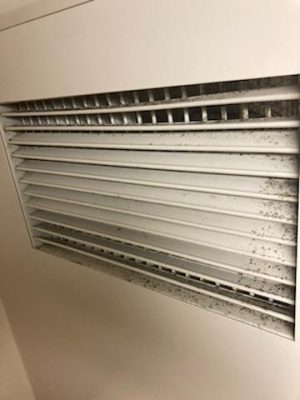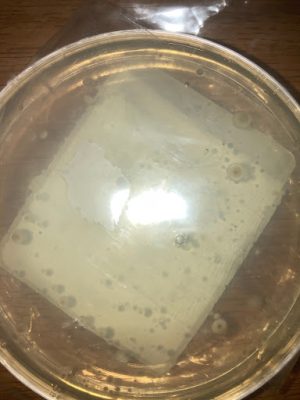Students leave residence halls as awareness of mold grows
Kent State has begun moving residents out of dorms as the news of mold in residence halls breaks. Freshman journalism major Hevin Wilkey moved out of her dorm in Fletcher Hall on Sept. 19 after she saw what looked like mold on her vents.
Since she moved in, Wilkey was constantly feeling sick and had a cough while she was in her dorm, and heard from a friend that it might be caused by mold in her HVAC unit.
“I got on my desk and I could see the mold right on my vent,” Wilkey said.

Around 4 a.m. on Sept. 15, she couldn’t fall asleep because of her cough, and called the non-emergency police line. After talking on the phone, two university facilities workers came to her dorm for the first time.
“He said it’s just dust,” Wilkey said. “He said, ‘I can guarantee you right now that that’s not mold.’”
That night the workers cleaned the mold from her room for around 30 minutes. They put a tablet in her vent to absorb excess moisture, cleaned pieces of the HVAC unit, and left.
Wilkey’s mother sent the university several pictures in an email. Douglas Pearson, associate vice president of facilities planning and operations, responded to the pictures with an email.
“They cleaned the fan coil unit and louvers in the bedroom and the exhaust fan louver in the bathroom,” Pearson said in the email. “Our Environmental and Safety Coordinator also visited the room and thought the debris on the louvers was dust.”
At 9:40 a.m. on Sept. 15, workers came to her dorm for a more thorough cleaning and inspection to check again for mold. Once again, she was told that it was dust and not mold.
She returned from class later that day and found her dorm in an unwell condition.
“There was dust-mold particles all over my floor [and] all over my desk,” Wilkey said. “The way I have my room set up is that directly next to my vent is one of my desks and that’s usually where my food stuff goes.”
Wilkey said she saw the remnants of the cleaning service and didn’t want to risk eating the food so she threw it away.
“It was all covered by the dust or mold, whatever those little black particles [were],” Wilkey said. “It was on my fridge which is also right next to my vent on the other side. They were going to clean, and made it worse, and my vents weren’t even clean all the way.”

Even after her room was cleaned, she still found the mold around her room, by her desk and fridge. Wilkey said she was unsatisfied with the job and the issues continued, and she got more sick from the mold.
“My cough was worse and it wasn’t only just while I was in my room,” she said, “Started to happen while I was out and about, blowing my nose really regularly, I definitely started eating less cause I was nauseous in my room.”
On Sept. 17, Wilkey felt very sick and went to the hospital. After an EKG and an X-ray, Wilkey felt fine and returned to her dorm room.
“So I went back and showed my mom my medications,” Wilkey said. “My pills were dissolving because of how humid it was.”
The exterior casings on the pills had begun to degrade, and the medication was ruined.
On Sept. 19, Wilkey decided to leave her residence hall and live at home for the time being.
“I do plan on demanding that I get some sort of compensation for it because I paid to live in this dorm,” Wilkey said. “I’m not even living on campus at all right now.”
Freshman marketing major Sara Malina, a resident in Fletcher Hall, also recently moved out due to mold.
“Our room was super humid and always moist all the time. Our clothes were wet when we put them on most of the days,” Malina said, “Then we noticed one day there was mold growing on our wardrobes.”
Malina talked to several people to find out what she could do about the situation.
“We went to housing, we were emailing people, calling people just trying to figure out what we can do,” Malina said, “We had people come and look at it and see what they wanted to do. They checked the thermostat and the air conditioning vents and stuff like that.”
Freshman early childhood education major Morgan Kellar, a resident in Centennial Court A, also recently reported suspected mold in her dorm room. A worker came to clean the HVAC unit while Kellar was there, and she saw his cleaning process.
“First he took off the big white vent and then he took like a shop-vac thing and vacuumed it out,” Kellar said. “Then he wiped it out with something, he said it was a sanitation thing. And then after he did that he put [the white vent] back on and then took off the top grate.”
Taking more steps to clean the unit, Kellar said the worker would come and go, coming back with different mechanisms to aid the process.
“[He] then vacuumed that out and then said he had to go to the maintenance closet to clean it,” Kellar said. ”Then he left for a little bit then came back and he brought a big tub with a power washer end and he said like, ‘This is chemicals,’ and I was like, ‘OK.’ and then he sprayed everything, and he put it back on, and then he left.”
Kellar said she thinks that the only part of the unit that was replaced is the filter, and the cleaning process took around 20 minutes.
Joan Seidel, Kent City health commissioner, told KentWired there are multiple different types of mold.
“It’s not the mold that can actually create problems. It’s the mycotoxins they produce,” Seidel said. “If mold can be carried through the wind and the breeze, it can certainly be carried through HVAC units as well.”
Seidel mentioned that keeping areas clean is very important, and if students are experiencing symptoms, to visit DeWeese Health Center.
The university’s response on Sept. 22 to the mold on campus has some students concerned.
“I think it’s overall decent. I don’t know, I was very confused where we would go if we did have mold, that was my biggest question,” said Chloe Kurian, a freshman integrated health studies major that lives on the third floor of Allyn Hall. “But other than that, I think it’s pretty good.”
“I just feel like we could have gotten something a little bit sooner,” Kurian said, “because we have heard for like the past couple weeks that this has been happening.”
Students with mold in their dorms can contact University Housing with concerns.
Anthony Scilla is a reporter. Contact him at [email protected].
Cassidy Grentz is a reporter. Contact her at [email protected].


